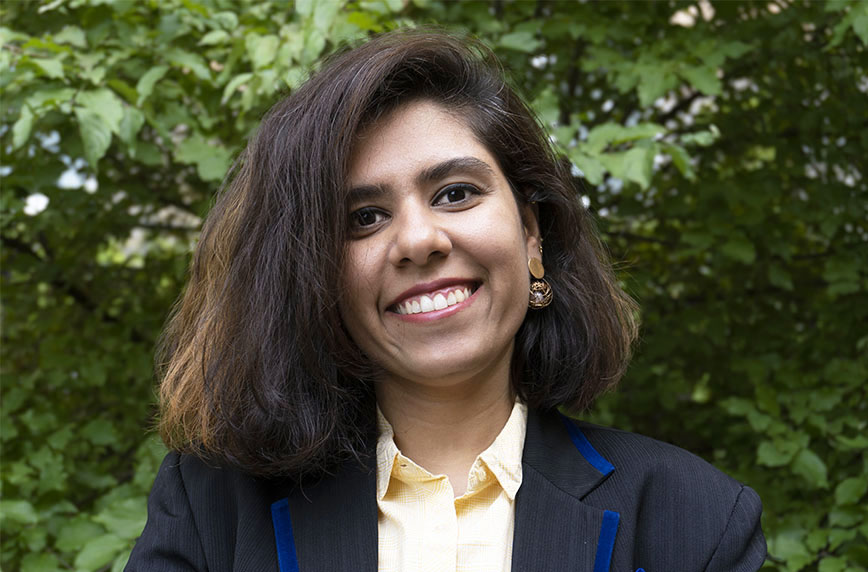Dhruvi
Dhruvi comes from Gujarat, India. She did her Bachelor's in Electrical Engineering from Sardar Vallabhbhai Patel Institute of Technology, Vasad. In her leisure time, she has always loved travelling and learning about various people and their cultures worldwide. She also enjoys being physically active and spend a lot of time doing some sports, going to the gym or hiking.

Why did you choose this master's programme at KTH?
My career aspirations are not childhood dreams but rather a consistent absorption of knowledge and learning about the domain. Growing curiosity and a typical penchant for science, especially physics and mathematics, saw me opting for Electrical Engineering. I was effectively fascinated by Power Systems and High voltage Engineering during my bachelors.
The master's programme in Electrical Power Engineering at KTH was the perfect match for my future ambitions. I was impressed by the extensive curriculum and the excellent peer network the institute offers. Looking at the degree projects made by former students in various domains, I was also excited about the subjects that were offered at the University. As a cherry on top, KTH holds a strong position in the world ranking, which easily lets me decide to choose it for my further studies.
What are the best aspects of your programme?
One of the benefits of studying at KTH is the opportunity to work alongside active researchers who are specialists in their fields. We have been exposed to high-quality and impactful research projects across a broad range of disciplines, some of which have been recognised as internationally acclaimed for their impact. It provided me with a once-in-a-lifetime opportunity, enhancing my global network to experiencing a new culture. While the Electrical Power Engineering programme covers a wide variety of subject areas, it also provides prospects to delve much deeper into niche areas of interest. Each course is designed differently, which can enhance leadership, communication, technical and research skills. There are four basic courses mandatorily taken out of six, which builds a foundation for an Electrical Engineer.
Further, we can choose the subjects which are best suited, thanks to the flexibility offered by KTH and make our path as we move forward. Exploring new topics builds the quality of challenging ourselves, learning unfamiliar and expanding skills. In other words, I can say my programme has let me significantly develop as an individual.
Have you chosen a specialisation track within the programme?
From the beginning, I have learnt the art of achieving quality excellence which has significantly contributed to my life. In addition, my goals involve learning maximum out of the chosen topics and set a breakthrough to get a new path towards my career. Electrical Power systems had fascinated me a lot when I was in my bachelors. Moreover, having had industrial experience in that field, I seek to enrich my understanding level and enhance my domain of designing so that I would specialise in the same track.
What are some of your favourite courses so far?
My strong inclination towards Power Systems and High Voltage (HV) Engineering guided me to opt for elective courses related to those subjects I liked the most. There were courses such as Management and leadership from other departments, which I enjoyed studying parallelly with the technical subjects. I met some of the most prominent leaders in the field through taking these topics, attending seminars and networking through the department. These connections helped me broaden my perspective and become a more well-rounded person. In my second year, I will be taking some technical and some non-technical subjects. Adding this to my career is a natural progression to build upon my skills and take my knowledge to the next level.
How do studies at KTH differ from your previous studies?
The studies at KTH and my home university are best in their place. Here, we have a period system of three months where we study different courses of averagely 15 credits and the exams are taken at the end of the period. Learning imparted is hands-on rather than theoretical. Most of the assignments involved group projects which developed teamwork quality. Furthermore, the KTH campus is vast, undergoing constant development, and offers various surroundings for students to select from, ranging from quiet to vibrant. KTH also has fitness and wellness facilities, as well as sporting activities. Its impressive huge campus allowed me to find hobbies that interested me and get involved in my leisure time. Moreover, we have the opportunity to broaden our horizons by meeting new people from all over the world, facing new challenges and participating in the vast array of new activities, clubs, and societies available. We may even be able to take part in our course overseas through "Exchange Studies" and learn a new language and culture alongside.

